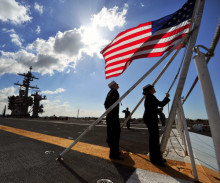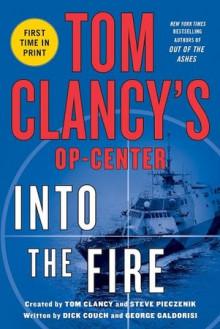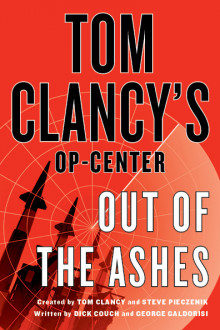When Dick Couch and I were asked to reboot the best-selling Tom Clancy Op-Center series, we wanted the first book to have a compelling geographic focus. We rolled the dice that the Middle East would remain in turmoil in the three years it took between our sharing our high concept for the book with our editor at St. Martin’s Press and the book’s release in 2014. Here’s why:
The Muslim East and the Christian West have been at war for over a millennium. They are at war today, and that is not likely to change in the near future. As Samuel Huffington would put it, the cultures will continue to clash. At times in the past, the war has been invasive, as in the eighth century, when the Moors moved north and west into Europe, and during the Crusades, when the Christian West invaded the Levant. Regional empires rose and fell through the Middle Ages, and while the Renaissance brought significant material and cultural advances to the Western world, plagues and corrupt monarchies did more to the detriment of both East and West than they were able to do to each other.
In time, as a century of war engulfed Europe and as those same nations embarked on more aggressive colonialism, the East-West struggle receded into the background. The nineteenth- century rise of nationalism and modern weapons technology in the West resulted in an almost universal hegemony, while the East remained locked in antiquity and internal struggle. The twentieth century and the developing thirst for oil were to change all that.
The seeds of today’s East-West conflict were sown when Western nations took it upon themselves to draw national boundaries in the Middle East after the First World War. The infamous Sykes-Picot agreement, which clumsily divided the Middle East into British and French spheres of influence, created weak-sister countries such as Syria, Iraq, and Lebanon, all-but ensuring permanent turmoil. After the Second World War, Pan-Arab nationalism, the establishment of the state of Israel, the Suez crisis, the Lebanese civil war, and the Iranian revolution all drove tensions between East and West even higher. While the competition for oil and oil reserves remained a major stimulus, longstanding Muslim-Christian, East-West issues created a catalyst that never let tensions get too far below the surface. And then came 9/11.
The events of September 11, 2001 and the retaliatory invasions that followed redefined and codified this long-running conflict. For the first time in centuries, the East had struck at the West, and delivered a telling blow. Thus, from Afghanistan to Iraq to Yemen to North Africa and into Indonesia, Thailand, the Philippines and beyond, the struggle has now become world-wide, nasty, and unrelenting.
Surveys taken just after 9/11 showed that some 15 percent of the world’s over 1.5 billion Muslims supported the attack. It was about time we struck back against those arrogant infidels, they said. A significant percentage felt no sympathy for the Americans killed in the attack. Nearly all applauded the daring and audacity of the attackers. And many Arab youth wanted to be like those who had so boldly struck at the West.
As the world’s foremost authority on the region, Bernard Lewis, has put it, “the outcome of the struggle in the Middle East is still far from clear.” For this reason, we chose the Greater Levant as the epicenter of our story of Op-Center’s reemergence.
Read more about Tom Clancy’s Op-Center: Out of the Ashes (Now available in mass market paperback, digital and audio editions) and other books in the series here:








